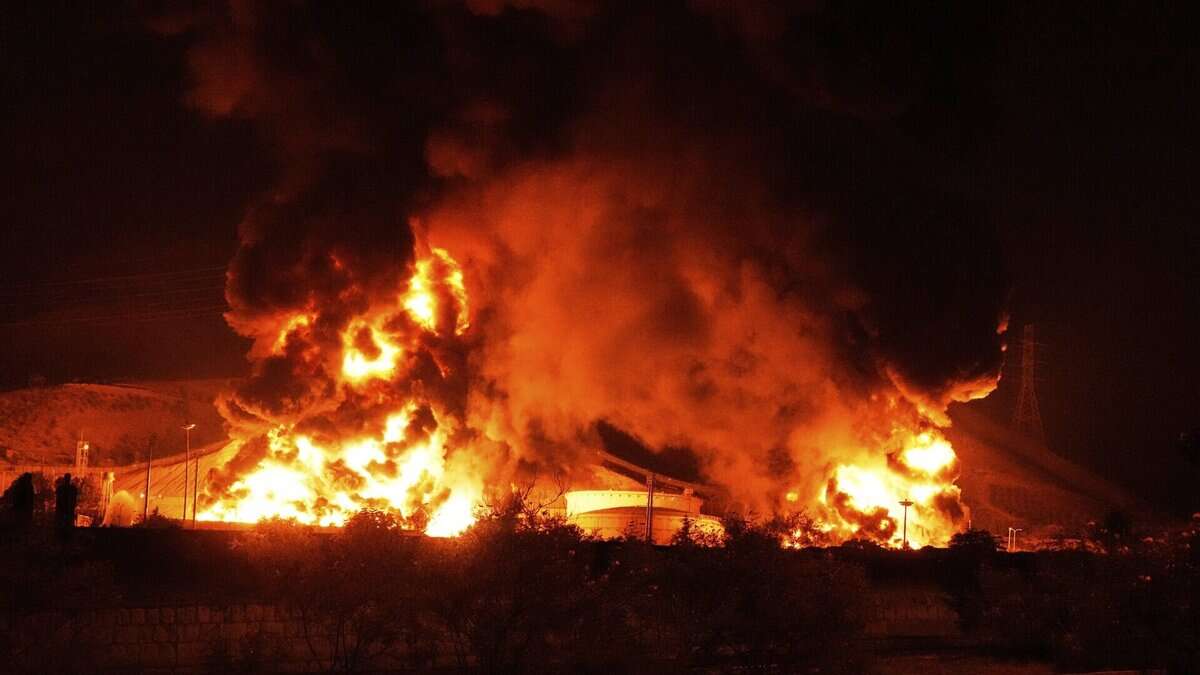
Dubai: Israel launched an expanded assault on Iran on Sunday, targeting its energy industry and Defence Ministry headquarters, while Tehran unleashed a fresh barrage of deadly strikes.
The simultaneous attacks represented the latest burst of violence since a surprise offensive by Israel two days earlier.
New explosions boomed across Tehran as Iranian missiles entered Israel’s skies in attacks that Israeli emergency officials said caused deaths around the country, including four in an apartment building in the Galilee region.
Casualty figures weren’t immediately available in Iran, where Israel targeted its Defence Ministry headquarters in Tehran as well as sites that it alleged were associated with the country’s nuclear programme. Iran’s paramilitary Revolutionary Guard claimed that Iranian missiles targeted fuel production facilities for Israeli fighter jets.
Senior commanders and nuclear scientists killed
Israel struck dozens of targets, including nuclear facilities, military sites, and private residences, across Iran on Friday, June 13, in what it described as “Operation Rising Lion.” The strikes reportedly killed several senior military commanders and figures linked to Iran’s nuclear programmes, according to IRGC-affiliated Tasnim News Agency.
Among those reported dead were:
- Mohammad Bagheri, chief of staff of Iran’s armed forces.
- Hossein Salami, commander-in-chief of the Islamic Revolutionary Guard Corps (IRGC).
- Gholamali Rashid, head of the IRGC’s Khatam-al Anbiya Central Headquarters.
- Amir Ali Hajizadeh, commander of the IRGC’s Aerospace Force, overseeing Iran’s missile programme.
- Fereydoon Abbasi, former head of Iran’s Atomic Energy Organisation (2011–2013).
Iranian state media also reported the deaths of several prominent nuclear scientists, including:
- Mohammad Mehdi Tehranchi, head of Azad University in Tehran.
- Abdulhamid Minouchehr, head of nuclear engineering at Shahid Beheshti University.
- Ahmad Reza Zolfaghari, nuclear engineering professor at Shahid Beheshti University.
- Amirhossein Feqhi, nuclear professor at Shahid Beheshti University.
Amid the continued conflict, planned negotiations between Iran and the United States over Tehran’s nuclear programme were cancelled, throwing into question when and how an end to the fighting could come.
Both Israel’s military and Iran state television announced the latest round of Iranian missiles as explosions were heard near midnight, while the Israeli security cabinet met.
Urgent calls to deescalate
World leaders made urgent calls to deescalate and avoid all-out war. The attack on nuclear sites set a “dangerous precedent,” China’s foreign minister said. The region is already on edge as Israel makes a new push to eliminate the Hamas in Gaza after 20 months of fighting.
Meanwhile, the sixth round of US-Iran indirect talks on Sunday over Iran’s nuclear programme will not take place, mediator Oman said. “We remain committed to talks and hope the Iranians will come to the table soon,” said a senior US official, speaking on condition of anonymity to discuss diplomacy.
Iran’s top diplomat said Saturday the nuclear talks were “unjustifiable” after Israel’s strikes. Abbas Araghchi’s comments came during a call with Kaja Kallas, the European Union’s top diplomat.
The Israeli airstrikes were the “result of the direct support by Washington,” Araghchi said in a statement carried by the state-run IRNA news agency.
US helps to shoot down Iranian missiles
Iran launched its first waves of missiles at Israel late Friday and early Saturday. The attacks killed at least three people and wounded 174, two of them seriously, Israel said. The military said seven soldiers were lightly wounded when a missile hit central Israel, without specifying where.
US ground-based air defence systems in the region were helping to shoot down Iranian missiles, said a U.S. official who spoke on condition of anonymity to discuss the measures.
Israel’s main international airport said it will remain closed until further notice.
The headline and article updated based on the latest information



